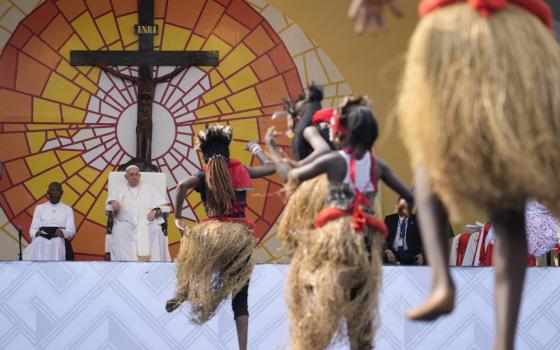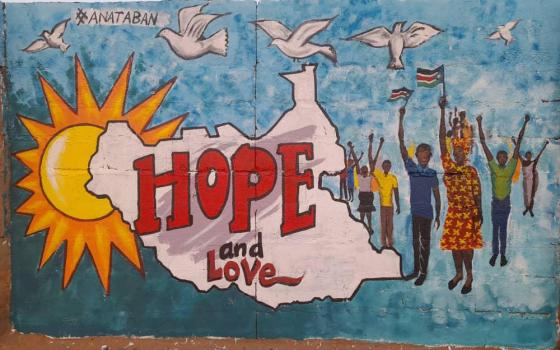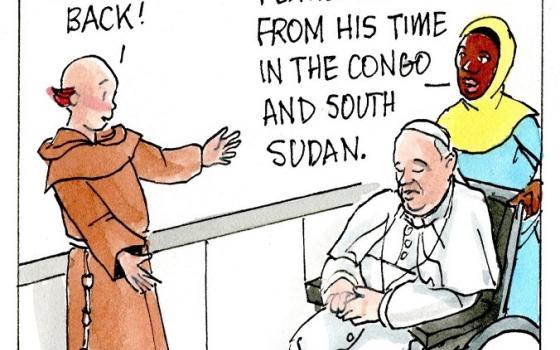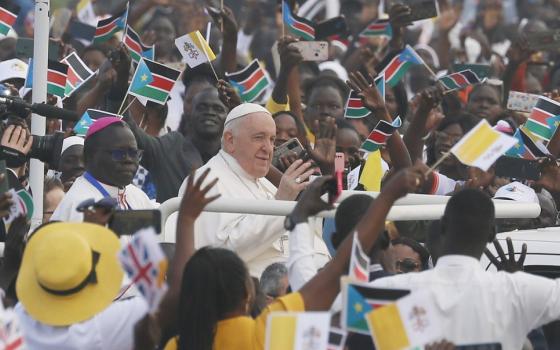Pope Francis greets the crowd before celebrating Mass at Ndolo airport Feb. 1 in Kinshasa, Congo. (CNS photo/Paul Haring)
At a Mass including more than one million participants, Pope Francis on Feb. 1 urged war-weary Congolese Catholics to lay down their arms and be a "conscience of peace," as Africa's most populous Catholic nation struggles against ongoing conflict and entrenched ethnic divisions.
"We need to believe that we Christians are called to cooperate with everyone, to break the cycle of violence, to dismantle the machinations of hatred," said the pope. "Yes, Christians, sent by Christ, are called by definition to be a conscience of peace in our world."
During his homily at the largest papal Mass on the African continent since Pope John Paul II's 1998 visit to Nigeria, Francis said the country's Catholics are called to follow Christ's example of forgiveness and peace and live accordingly as disciples of Jesus in today's world.
"In a world disheartened by violence and war," said the pope, "Christians must be like Jesus."
"We need to find room in our hearts for everyone; to believe that ethnic, regional, social and religious differences are secondary and not obstacles; that others are our brothers and sisters, members of the same human community; and that the peace brought into the world by Jesus is meant for everyone," he declared.
The pope's remarks come just one day after his arrival on Jan. 31, when he issued a blistering criticism of world powers that exploit Congo's expansive natural resources, as well as the country's own divided leaders whose corruption and greed have often crippled the nation's development.
Speaking directly to the sprawling crowds of the country's Catholics, Francis sought to ensure those at the Mass that Christ had not forgotten their suffering.
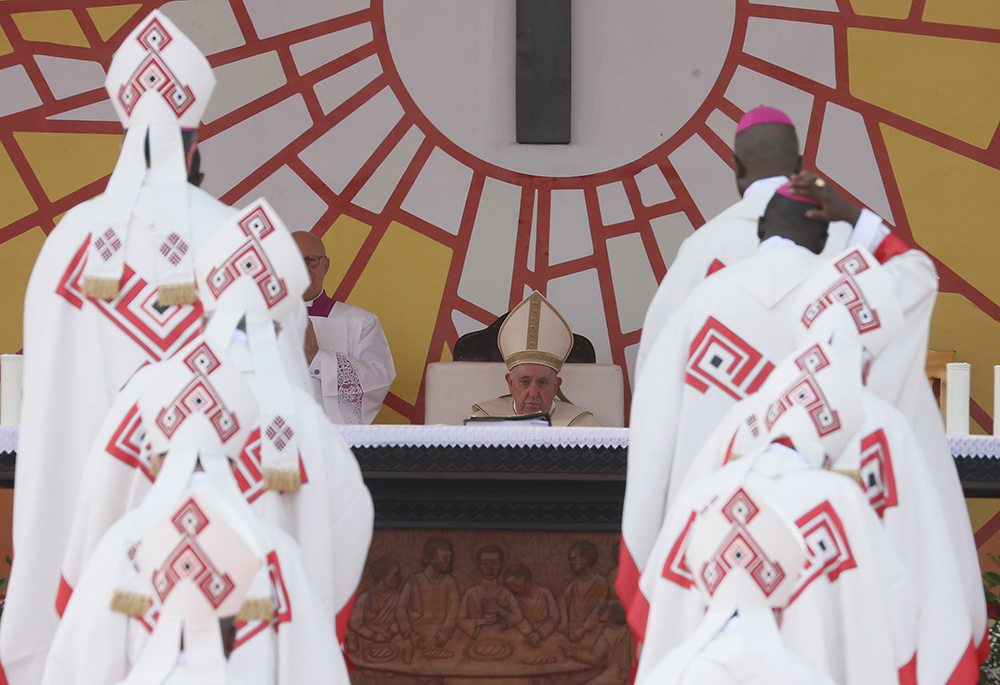
Pope Francis celebrates Mass at Ndolo airport Feb. 1 in Kinshasa, Congo. (CNS/Paul Haring)
"He knows your wounds; he knows the wounds of your country, your people, your land!" said the pope. "They are wounds that ache, continually infected by hatred and violence, while the medicine of justice and the balm of hope never seem to arrive."
"We who belong to Jesus must never yield to sorrow; we must not permit resignation and fatalism to take hold of us," he added. "Even though that atmosphere reigns all around us, it must not be so for us."
Hundreds of thousands of attendees — a vast majority of whom were young people — camped out overnight on the grounds of the N'dolo airport to await the pope's arrival on a day declared by the Congolese government to be a public holiday.
As Francis circled through the venue in his popemobile ahead of the Mass, the crowds roared with cheers, songs and thundering applause. Over a dozen teenage boys danced on the wing of an abandoned aircraft hoping to get a glimpse of the pope and, despite the sweltering temperatures, a sea of multicolored traditional dresses with images of Francis superimposed over an outline of the African continent filled the airfield.
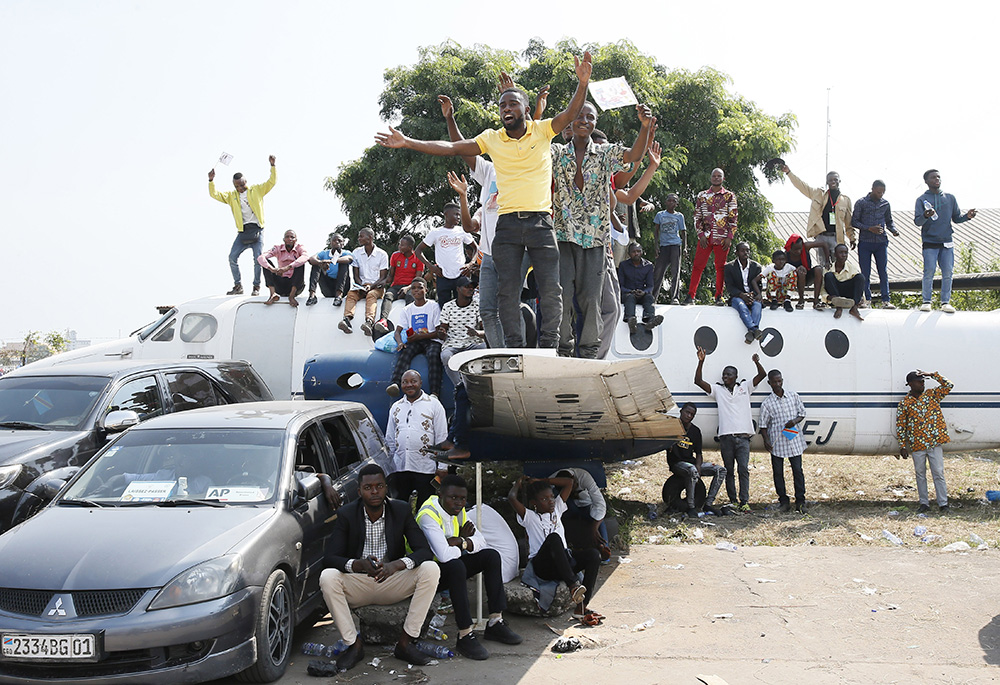
Young people stand on the wing of a retired airplane as Pope Francis celebrates Mass at Ndolo airport Feb. 1 in Kinshasa, Congo. (CNS/Paul Haring)
"He kept his promise," said Oblates of Mary Immaculate Fr. Edy Mabila, who looked on in awe as he took in the scene and reflected back on the pope's promise to visit the country, despite having to postpone plans to originally visit in July 2022 due to a knee injury.
"He is coming to us as our father," he told NCR. "He will help us work for peace in our country and bring a message that could help change the way we live."
Prior to the start of Mass, 33-year-old Yasmine Lusamba Kadima recalled seeing Francis last June when she attended the Vatican's World Meeting of Families.
"I saw him in Rome, but to see him here in my own country means more than I can describe," she said. "I will tell this to my children and to my grandchildren."
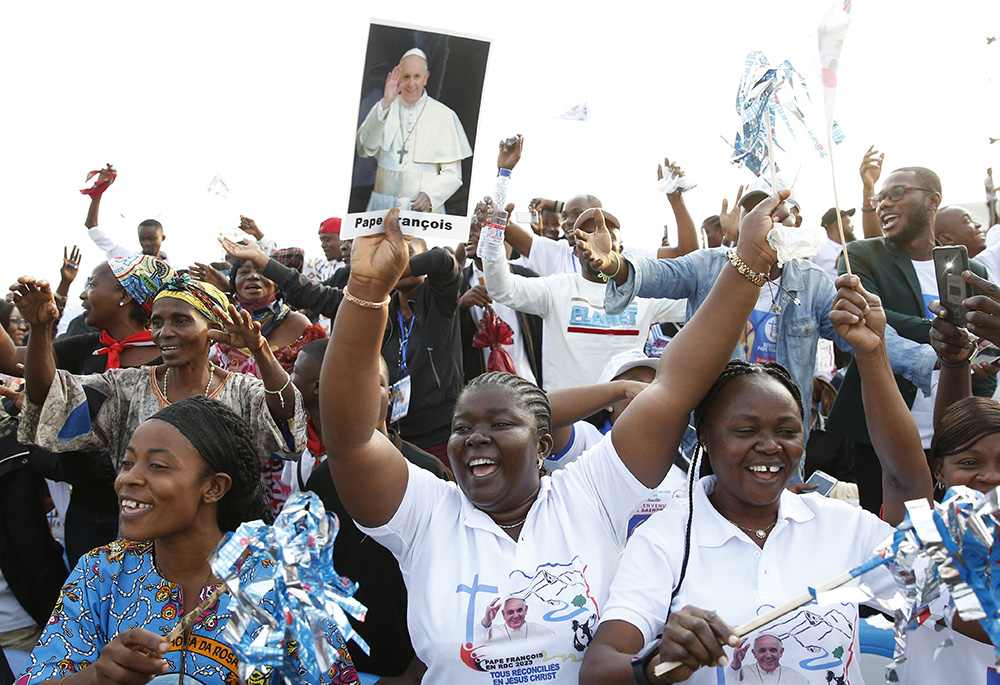
Pope Francis celebrates Mass at Ndolo airport Feb. 1 in Kinshasa, Congo. (CNS/Paul Haring)
According to official Vatican statistics, Catholics make up over half of Congo's population of some 95 million, on a continent where the faith is growing more rapidly than any other region in the world.
Reflecting on this reality, Kadima told NCR that "our faith has the message for what we need now in our country."
The shifting demographics and changing dynamics of world Catholicism were not only present in the crowds, but also in the celebration of the Mass, which incorporated the African languages of Lingala, Swahili and Kikongo and other elements of the Zaire usage of the church's Roman rite liturgy.
Prior to the Second Vatican Council, the Diocese of Zaire — the former name of the Democratic Republic of Congo — sought to develop a liturgy more sensitive to its local norms and cultures and one that better facilitated the participation of the laity in the celebration of the Mass. After years of experimentation, John Paul II formally approved it in 1988.
Advertisement
Ahead of Francis' arrival in Africa, liturgical scholar Nathan Chase told NCR he believes the Zaire rite "epitomizes the vision of Vatican II, which sought to restore the diversity of the church’s liturgy in order to serve the pastoral needs of each local church."
"Sadly, it also remains pretty much the only model, at least with regard to the Eucharist," said Chase, who teaches at the Aquinas Institute in St. Louis, Missouri.
In 2020, however, Francis gave the Zaire usage his full backing, saying it "can serve as an example and model for other cultures," including a potential Amazonian rite.
As he became the first pope to celebrate the Mass in the country since the rite's official approval, Francis told the multitudes to embrace the diversity of both their country and their faith, and to focus not on what divides, but what what unites them.
Together, he said, they can be "missionaries of the 'mad love' of God for each human being."




